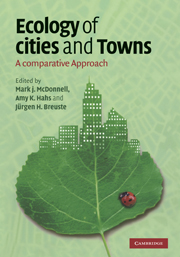Book contents
- Frontmatter
- Contents
- List of contributors
- Preface
- 1 Introduction: Scope of the book and need for developing a comparative approach to the ecological study of cities and towns
- Part I Opportunities and challenges of conducting comparative studies
- Part II Ecological studies of cities and towns
- Part III Integrating science with management and planning
- Part IV Comments and synthesis
- 30 What is the main object of urban ecology? Determining demarcation using the example of research into urban flora
- 31 How to conduct comparative urban ecological research
- 32 Ecological scientific knowledge in urban and land-use planning
- 33 Envisioning further steps in comparative urban ecology
- 34 Towards a comparative ecology of cities and towns
- 35 A comparative ecology of cities and towns: synthesis of opportunities and limitations
- References
- Index
- Plate section
34 - Towards a comparative ecology of cities and towns
Published online by Cambridge University Press: 04 March 2010
- Frontmatter
- Contents
- List of contributors
- Preface
- 1 Introduction: Scope of the book and need for developing a comparative approach to the ecological study of cities and towns
- Part I Opportunities and challenges of conducting comparative studies
- Part II Ecological studies of cities and towns
- Part III Integrating science with management and planning
- Part IV Comments and synthesis
- 30 What is the main object of urban ecology? Determining demarcation using the example of research into urban flora
- 31 How to conduct comparative urban ecological research
- 32 Ecological scientific knowledge in urban and land-use planning
- 33 Envisioning further steps in comparative urban ecology
- 34 Towards a comparative ecology of cities and towns
- 35 A comparative ecology of cities and towns: synthesis of opportunities and limitations
- References
- Index
- Plate section
Summary
Introduction
Much urban ecology to date has focused on the ecology of individual cities and towns, with limited comparison or synthesis of results. However, comparative studies between cities and between taxonomic groups are needed to improve our understanding of the structure and function of urban ecosystems, and to identify general principles such as patterns of biodiversity loss or changes to soil processes following urbanisation. The Melbourne Urban Ecology Workshop on the comparative ecology of cities and towns brought together researchers representing a diversity of continents, disciplinary backgrounds and approaches, with the aim of developing a conceptual and practical framework for comparative urban ecology. This broad mix of cultures and perspectives made for a very stimulating workshop, but on occasion it also led to some confusion and disagreement. I have based my summary on four themes that emerged from the workshop; definitions, diversity, tools and approaches, and identifying the common elements of cities and towns. I have also included an example of a comparative, urban ecological study using tools and approaches presented during the workshop in conjunction with established ecological theory.
- Type
- Chapter
- Information
- Ecology of Cities and TownsA Comparative Approach, pp. 567 - 573Publisher: Cambridge University PressPrint publication year: 2009



